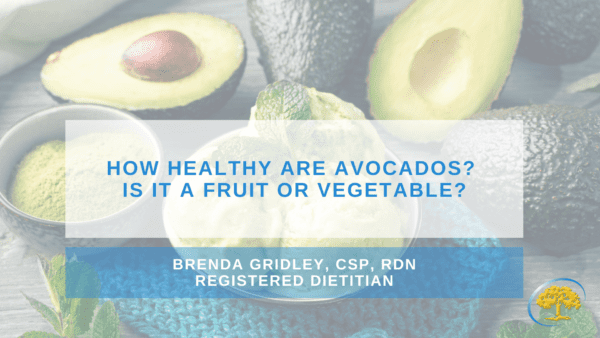
Posted 2 years ago
How Healthy Are Avocados? Is it a Fruit or Vegetable?
Avocados are a powerhouse food, complete with healthy fats, fiber, lots of vitamins, minerals, anti-oxidants and anti-inflammatory compounds. This fruit (Surprise! It’s a fruit) is filling, satisfying and versatile, making it easy to incorporate into your daily diet.
While some people refer to avocados as fruits and some people say they’re a vegetable, avocados (Persea americana) are considered berries. They’re a member of the Lauraceae plant family, which also includes the cinnamon tree.
Avocados are so versatile given their creamy, bland taste which can be mixed with almost anything. You can blend avocado into smoothies; use it as a base for a salsa, dressing or dip; pile slices on a burger or sandwich; and dice it over a salad or some protein-packed cottage cheese. You can even use it to make pudding or fudge.
Some people with irritable bowel syndrome (IBS), SIBO [small intestinal bacterial overgrowth] or other digestive issues need to be a little cautious with how much avocado they eat because they are relatively high in FODMAPs. FODMAPs are types of carbohydrates that are poorly digested by people with IBS. But everyone is unique, and plenty of people with digestive issues do absolutely fine with avocados.
As with many healthy fruits and veggies, avocados work best in synergy with other foods. They help your body absorb fat-soluble vitamins like A, D, E and K. So eating avocado with a salad or any other veggies actually helps you to absorb the vitamins from those foods.
Vitamins and Minerals
Avocados are high in several important nutrients, often lacking in many people’s diets, including magnesium, B6, vitamin C, vitamin E, and folate. Half of an avocado provides 10% of the daily value (DV) for potassium. Potassium is needed for several critical bodily functions, including blood pressure regulation and nervous system function, so getting eating avocados regularly may help protect against hypertension and stroke.
Avocados also provide nutrients that are essential for the health of the immune system, including vitamin C, B6, and E. Half of an avocado provides 15% of your daily needs for B6, a nutrient that helps suppress inflammation and protect against oxidative damage. Inadequate B6 intake may negatively impact immune function and increase susceptibility to illness.
Great source of Antioxidant and Anti-inflammatory Compounds
In addition to vitamins, minerals, healthy fats, and fiber, avocados are packed with bioactive compounds including carotenoids, vitamin C, vitamin E, and phenolic compounds. These substances have been shown to have significant antioxidant, neuroprotective, and cardioprotective activities.
For example, carotenoids found in avocados including lutein, α-Carotene, and β-Carotene have been shown to have strong antioxidant effects, protecting against oxidative damage, which is associated with the progression of many chronic diseases.
A small study that included 45 people found that eating an avocado a day increased blood levels of the carotenoid lutein compared with a typical Western diet without avocados. Having greater dietary intake and higher blood levels of antioxidants contained within avocados, like vitamin C and carotenoids, has been associated with better cognitive function, improved heart health, and more.
Gut Health
Avocados are high in fiber, providing about 14 grams in each. That’s nearly half of the current DV for this important nutrient. Getting enough fiber in your diet is essential for the health of the digestive system because it helps promote the growth of healthy bacteria. A study with 163 adults considered overweight found that people who consumed 175 grams (men) or 140 grams (women) of avocado daily for 12 weeks had lower fecal bile acid concentrations and increased bacterial diversity compared to a control group. Greater bile acid concentrations induce intestinal inflammation and are related to the growth of microbes associated with negative health outcomes like colon cancer. Additionally, the avocado group had more of the bacteria Faecalibacterium, Lachnospira, and Alistipes, all of which produce short-chain fatty acids (SCFAs), including butyrate. SFCAs help fuel colon cells and protect against diseases like colorectal cancer and inflammatory bowel disease.
Reduce Heart Disease
A 2022 study from the American Heart Association found that higher avocado intake was associated with a lower risk of cardiovascular disease (CVD) and coronary heart disease in over 100,000 people. More specifically, people who ate avocados at least three times per week had a 16% lower risk of CVD and a 21% lower risk of coronary heart disease. Replacing just half a serving per day of margarine, butter, egg, yogurt, cheese, or processed meats with the equivalent amount of avocado was associated with a 16% to 22% lower risk of CVD.
Avocados may help increase heart-protective HDL cholesterol and decrease levels of oxidized LDL cholesterol, a type of cholesterol that’s significantly associated with atherosclerosis, or the buildup of plaque along artery walls. Additionally, the high potassium and magnesium content of avocados is beneficial for blood pressure regulation. Keeping blood pressure at a healthy level is critical for heart disease prevention.
Can Help Achieve a Healthy Body Weight
Although there are multiple factors that influence weight, following a nutritious and balanced diet is perhaps most important when it comes to reaching and maintaining a healthy body weight, which is critical for disease prevention.
Even though avocados are high in calories, they’re packed with nutrients and help promote satiety, thanks to their high fiber and healthy fat content. The healthy fat, specifically, monounsaturated fat, and fiber in avocado is to thank for that wonderfully satisfied feeling you get after eating the fruit. One medium avocado has about 15 grams of monounsaturated fat and 10 grams of fiber, a powerful combination of nutrients that will make you feel satiated sooner and keep you full for longer.
The fat and fiber are also two of the reasons eating avocado can help you lose weight. In a study published in Nutrition Journal, researchers found that people who ate avocados regularly had significantly lower body weight, BMI and waist circumference than those who didn’t participate. They May Improve Sleep
In a recent study published in the Journal of the American Heart Association, researchers asked 500 overweight people to eat one large avocado every day for six months and another 500 participants to pass on the fruit. By the end of the study, the avocado group had lost slightly more visceral fat (the dangerous type of fat around your organs) and had larger reductions in total cholesterol and LDL (bad) cholesterol levels.
Storage and Choosing
If you’re looking for a way to keep your avocados as fresh as possible, place ripe avocados in the refrigerator until you’re ready to enjoy them. If your avocado is still hard and green, let it sit on your counter for several days to ripen. Ripe avocados are slightly soft to the touch and usually have a deep green color. If your avocado is very mushy and dents when poked, it’s likely past its prime. However, even overripe avocados can be incorporated into recipes like baked goods and dressings, so don’t toss them unless they have a sour taste or smell, are moldy, or if the flash is extremely discolored.
Here are some ideas for how to incorporate more avocado into your diet:
-Use avocado in place of mayo with Greek yogurt in chicken, salmon, egg, and tuna salads.
-Make a classic guacamole using ingredients like avocados, onions, lime, and cilantro.
-Toss frozen avocado chunks into smoothies for a source of healthy fat.
-Top chilis and soups with sliced avocado.
-Incorporate avocado into salads and grain bowls.
-Whip up a dairy-free avocado chocolate mousse.
-Bread avocados and bake them for a crispy treat.
-Pair half an avocado with eggs and berries for a filling breakfast.
-Smash avocado on top of toast or a half roasted sweet potato.
-Stuff avocados with chicken salad or bean salad.
-Use avocados in tacos and burritos.
-Blend avocado with olive oil, lemon juice, and seasonings for a quick and easy creamy dressing.
-Top your favorite burger with sliced avocado.
-Sprinkle an avocado half with a bit of coarse salt and pepper and enjoy it right out of the rind.
Brenda Gridley, CSP, RDN

Areas Brenda has managed include pediatric and neonatal intensive care units where she was responsible for individualizing therapeutic diets and alternate nutrition support based on specific metabolic needs, medical conditions, and cultural preferences.
Her passion for nutrition was developed at a young age and reared by her grandmother who always instilled the importance of a healthy diet and active lifestyle. When her grandmother became ill, Brenda became aware of the impact nutrition plays in disease prevention and maintaining overall mind and body health.
